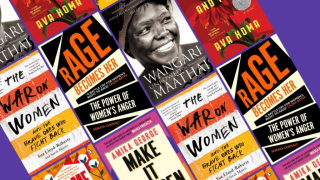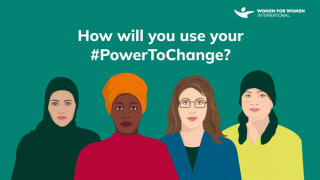Change Agents paving the way for women's land ownership
For many women where we work, owning land doesn't seem like an option. Our change agents are proof that not only is it possible, but it is the key to economic independence.
Where we work in the Democratic Republic of Congo, restrictive gender norms, exacerbated by poverty, limit women’s ability to buy their own land.
Many of the women who enrol in our Stronger Women, Stronger Nations Programme have not completed formal education and lack a stable income, as well as access to banking to make savings. This, coupled with gender discrimination, means that women rarely own their own land, in their own name - limiting their opportunities for investment, securing their children's futures, and improving their status within the community.
As part of our programme, women are supported to form Village Savings and Loan Associations (VSLAs) – self-managed groups that allow members to save and invest money by buying shares. Women can then take out small loans from the savings pot to grow their businesses or put towards an investment. Women in our programme are also taught about their rights and decision-making. This covers issues from family planning and domestic abuse, to the right to vote, to inheritance and to land ownership.
Three of our programme graduates, Gorette, Furaha and Gentille, have defied societal norms and bought their own land. Now, they are helping other women to do the same.
Since graduating from our year-long programme, Gorette, Furaha and Gentille have gone on to become advocates in their communities. Now enrolled in our Change Agents Programme, they are strengthening their leadership and advocacy skills to help other women find economic and social empowerment as they have, and to encourage men and community leaders to support women in their business endeavours and investments.
Read Gorette, Furaha and Gentille's stories below, where they share how they became landowners, the challenges they faced and their advice to other women following in their footsteps.
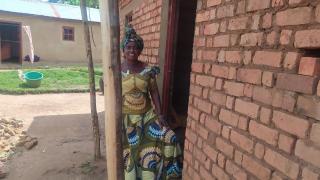
Gorette's Story
Men and community leaders should support women’s initiatives and collaborate with them.
I was among the first women in my community to join Women for Women International’s programme. With the monthly stipend, we started our own savings group. It allowed me to start a small business, which made me the money I used to buy the land I own today. It is registered in my name.
When I bought this land, I did not face any barrier from my husband because we had already discussed and agreed. The only barrier I faced was from my family. They thought that when I bought my own land, it meant I was planning to leave my husband. I have children from another man and people started saying I bought it for my two children from a previous relationship. But with my husband’s support, I was calm. I did not care about the community - I had an understanding with my husband, so no one could make it an issue.
Neighbours want to grab my land but I have the legal documents so I am covered. I used to have other land but it was sold by my husband without my consent. He cannot sell this land where we live today – I am safe because it has my name on the document.
When you own land as a woman you cannot be discriminated against.
Once a woman becomes economically empowered and contributes to household revenue, you are more valuable. Having this land means I can get a loan because I have something valuable to trade with, and I can rent the land for business or agriculture usage.
I am feeling respected, strong, and protected.
Women should always make savings to be economically independent. They should buy their own land because if they depend on men to provide everything, they will remain discriminated against. I hope men will allow their women to do their business freely - it contributes to the development of a household, and it gives respect to women.
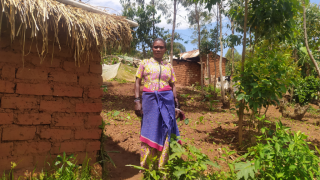
Furaha's Story
For me, the big advantage of having my land is to have a place to leave for my children, to prepare for my children’s futures.
When I joined Women for Women International’s programme, we were given a monthly stipend and taught to save every month in a group. After 12 months of saving, I got my share of 216,000 FC (~80 GBP). My neighbour was selling part of his land. I went to talk to him and he agreed to sell it to me for 300,000 FC (~110 GBP).
Because of the savings I made, plus some money from my maize selling business and a loan from my friend, I managed to collect enough money in total.
Here, when you buy land from someone, you must sign a bill of sale in your name, which binds both buyer and seller. We learnt about these things in the Stronger Women, Stronger Nations Programme, so I now have a legal document to prove my ownership.
But it wasn't without challenges, starting with my husband. He said it was okay to buy the land but he wanted it to be registered in his name, not mine. Since I had already written the agreement document in my name, I told him it was for our family, especially for our children. Later, one of my neighbours tried to grab a piece of my land. I went to a local leader to settle the dispute and it was okay because I showed them the document proving the remit of my land.
In the community, women saw me as a strong woman.
People say “women cannot buy land; women cannot own land” - but I bought it, even if it was a challenge.
I have 3 boys and 2 girls – the only thing I can leave them is land. I have bought another piece of land for my son, the oldest, and I will keep buying for all of them until they all have land to live on and with their own name on the documents.
I believe that if I bought land then other women can as well.
Men must please stop selling their household land without consulting their wives. I ask men to buy more land rather than trading it for beer and finishing the family money by drinking.
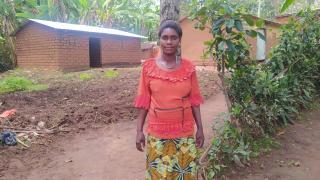
Gentille's Story
Way back, the community believed women could not buy land on their own. Now things are changing.
I acquired my land before Women for Women International’s programme started in Nyangezi. The way I acquired it was by selling pigs, goats and agriculture products (such as beans and cassava) harvested in my field. I have been living here for more than 14 years. The Stronger Women, Stronger Nations Programme helped me save money with my group. It helped me to build the current house I am living in.
I was the one in charge of the building process. It required paying the workers and purchasing steel sheets and other construction materials. Currently, I am building another house on the same land and the funds came from my current savings group, as well as my business working in a small store.
The land value was $60 when I bought it. I believe the current value is $600.
I did not go through many barriers when I bought land because I was unmarried. For me, living in this community where polygamy is widespread, and women are left by their husbands and children, having this land is important.
Women who managed to buy were considered rich and 'shindikana' (meaning 'rude') but some women are now regretting not taking that step.
Women for Women International's work in the Democratic Republic of Congo is generously supported by players of People's Postcode Lottery.
Keep Reading
Women's History Month Book List
subtitle:
Feed your mind this Women's History Month with books from women writers. Their powerful words and stories honour women throughout history and across the globe - their lives, experiences and courage to drive change.
On International Women’s Day 2022, we want to elevate the voices of the changemakers in the countries we work. These are women who are demonstrating their #PowerToChange social norms and are committed to creating a ripple effect for generations to come. Meet Khalida, Latifa and Zainab - women in our global team who have shared their inspiration, changes they've seen, and their hopes for the future.
The realities and experiences of the most marginalised women affected by conflict are unlikely to be captured in official, national-level data. That's why we started publishing data from the women in our programmes in 2017 - increasing their visibility. Read our top 10 highlights from our monitoring and evaluation data on how our work aligns with the UN Sustainable Development Goals.

